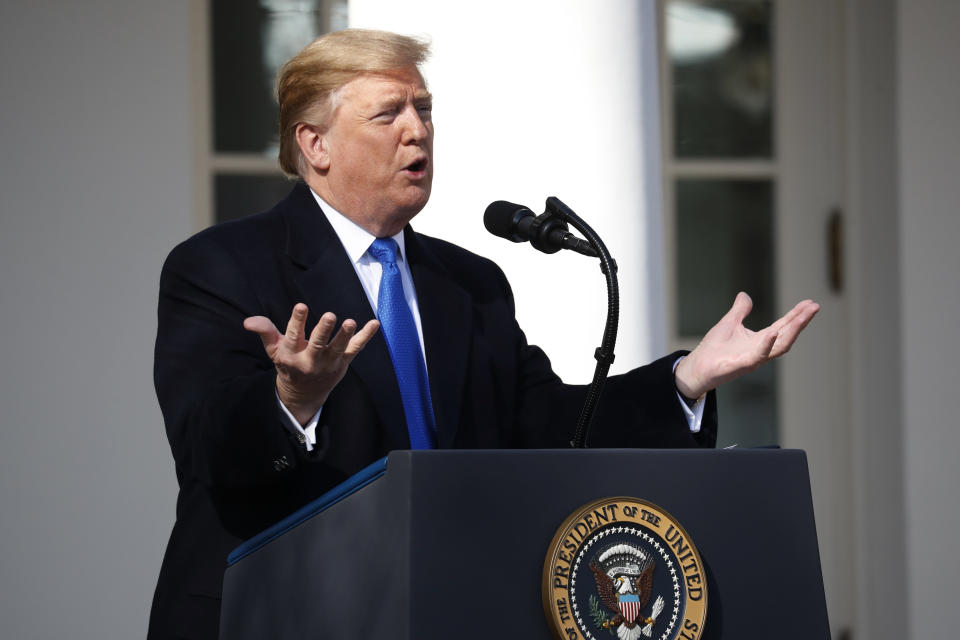'I didn't need to do this': Trump declares national emergency to build a wall

In a rambling, teleprompter-free diatribe, President Trump announced that he was declaring a national emergency in order to build a wall at the southern border.
Speaking in the White House Rose Garden Friday morning, after a long digression in which he touched on trade policy with China, the war on ISIS and other subjects, Trump announced he would take executive action to divert federal money to declare a national emergency for “virtual invasion purposes.”
In doing so, he brought up many of the discredited arguments he has been relying on over the last several months. He said drugs coming across the southern border don’t come through official ports of entry (not true), that El Paso, Texas, was dangerous before the construction of a wall (not true) and that women are being trafficked across the unguarded portions of the border (no evidence exists of this). Trump also disputed studies that have found undocumented immigrants commit crimes at a lower rate than native-born citizens.
Newsletter: The Yodel
Trusted news and daily delights, right in your inbox
See for yourself — The Yodel is the go-to source for daily news, entertainment and feel-good stories.
An emergency declaration would allow Trump to divert funds appropriated for other purposes to build the wall. Trump has said he would shift the money from “far less important” government programs, including the Department of Defense. A Pentagon official told the New York Times that one likely scenario would be to divert up to $2.5 billion in counternarcotics funds to the Army Corps of Engineers.

This is a departure from Trump’s original campaign promise that Mexico would pay for the wall. The administration did not press for money to build a wall during the two years when Republicans had control of both the Senate and House. Illegal border crossings have declined during that time, and the administration has not explained why the border situation is now an emergency. If, as seems likely, there is a constitutional challenge to the declaration, it may hinge in part on Trump’s admission in his remarks that “I could do the wall over a longer period of time. I didn’t need to do this.”
A deadlock with Congress over border security issues led to the 35-day partial government shutdown that ended last month. Congress passed a continuing resolution Thursday to fund the government and avert a second shutdown, and Trump has agreed to sign it, but he made no mention of it in his remarks.
House Speaker Nancy Pelosi has the option of triggering a vote on Trump’s declaration, forcing Republicans to go on the record about whether they support the emergency wall. Two Democratic representatives, Joaquin Castro of Texas and Alexandria Ocasio-Cortez of New York, have already announced plans to introduce a resolution that would terminate the emergency declaration.
But even if the declaration survives congressional challenges over appropriations, actually building the wall could face legal challenges from landowners along the border whose property would need to be acquired. Trump acknowledged that this act would likely face a legal challenge that could reach the Supreme Court.
While Senate Majority Leader Mitch McConnell said he was supportive of Trump declaring a national emergency, many of his Republican colleagues were less enthusiastic. Sen. Marco Rubio of Florida called it a “bad idea,” Sen. Susan Collins of Maine said it was “of dubious constitutionality” and Sen. Ron Johnson of Wisconsin said, “It would be a pretty dramatic expansion of how this was used in the past.”
On Thursday, Pelosi warned that a future Democratic president could use the precedent of declaring a national emergency for other purposes, such as gun control, citing the anniversary of the Parkland, Fla., mass shooting that left 17 dead.
"Because if the president can declare an emergency on something that he’s created as an emergency, an illusion he wants to convey, just think what a president with different values could present to the American people,” said Pelosi. “You want to talk about a national emergency? Let's talk about today. The one-year anniversary of another manifestation of the epidemic of gun violence in America. That's a national emergency. Why don't you declare that emergency, Mr. President? I wish you would. But a Democratic president can do that. A Democratic president can declare emergencies as well."
All the major network and cable news outlets carried Trump’s Rose Garden announcement live. But as the president’s rambling speech wore on, CBS cut away and returned to its regularly scheduled programming — which, on the East Coast, was “The Price Is Right.”
Trump’s declaration of a national emergency came hours before he was scheduled to depart the White House for his Mar-a-Lago estate in Palm Beach, Fla., for the weekend.
